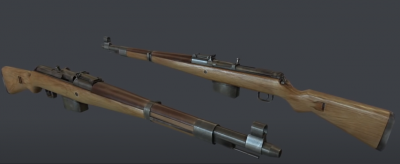Difference between revisions of "Gewehr 41"
(Created page with "{| class="wikitable floatright" | colspan="2" style="text-align: center;" | [] |- style="background:#666600; color:#fff;" | colspan="2" style="text-align: center;" | '''Gewehr...") |
|||
| Line 1: | Line 1: | ||
{| class="wikitable floatright" | {| class="wikitable floatright" | ||
| colspan="2" style="text-align: center;" | [] | | colspan="2" style="text-align: center;" | [[File:Weapon Rifle Semi G41.PNG|400px]] | ||
|- style="background:#666600; color:#fff;" | |- style="background:#666600; color:#fff;" | ||
| colspan="2" style="text-align: center;" | '''Gewehr 41''' | | colspan="2" style="text-align: center;" | '''Gewehr 41''' | ||
Revision as of 05:15, 5 September 2020

| |
| Gewehr 41 | |
| Specifications | |
| Type | Semi-automatic Rifle |
| Caliber | 7.92mm |
| Feed System | 10 Round Box |
| Muzzle Velocity | 776m/s |
| Maximum Effective Range | 400m |
History
The Gewehr 41 was produced during the Second World War in response to a German Army requirement for a self-loading rifle. The Army's procurement office laid down strict guidelines to govern the design of such a rifle. Its action was not to be cycled by gas tapped from the barrel (the most common means of working such weapons), the upper part of the rifle was not permitted to move while the action cycled and, if the gas system failed, the rifle had to be capable of being charged manually. Designs were submitted by the firms Mauser and Walther. Both harnessed the power of gas trapped in a cone at the muzzle to work them. This had the disadvantage of making the rifle muzzle-heavy and proved a difficult mechanism to keep free from fouling in combat conditions. During 1942 the two weapons were produced in tandem, as the G41 (M) and the G 41 (W). The latter proved more efficient - largely due to the fact that Walther had paid little attention to the stipulations about moving parts and manual charging. In December 1942 the G41 (W) was adopted for service as the G41 and production of the G41 (M) ceased. The G41 went in to manufacture with Berlin-Lübecker Maschinenfabrik as well as Walther, but never became truly reliable or popular with its users. Production ended in early 1944.
Game Play